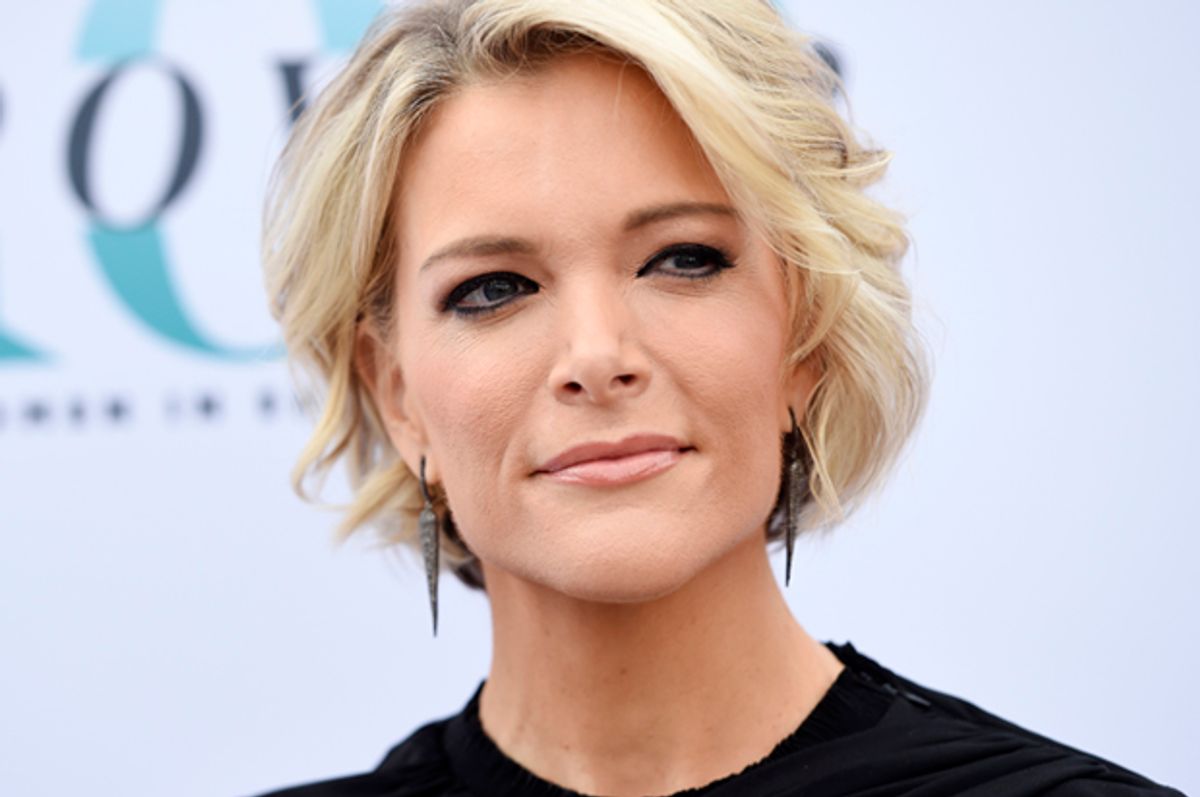A day after Megyn Kelly’s hotly debated interview with Infowars host and conspiracy theorist Alex Jones finally aired, I am of two minds about the whole business.
Kelly's performance exceeded expectations, mine included. Unlike her NBC News colleagues, however, or New York Post columnist John Podhoretz, I’m not ready to give her a cookie just yet. That’s because Kelly did what any decent interviewer is supposed to do, in that she did not let Alex Jones get away with using the deaths of children in mass murder events committed by unhinged perpetrators as tools of brand expansion.
Then again, while a number of reasonable, previously skeptical viewers may be impressed with the way the host acquitted herself, there’s no question that Kelly also bolstered Jones’ profile while not necessarily doing much to elevate hers.
The week leading up to the Kelly-Jones face-off yielded a multifaceted debate on journalism’s role in situations that require an interviewer to air a conversation with an odious person. Jones is a wing nut who has built a multimillion-dollar media enterprise on perpetuating baseless and outrageous claims about news reports, with the topmost among them being his claim that the 2012 mass shooting at Sandy Hook Elementary School in Newtown, Connecticut, was a hoax.
Critics and people directly affected by Jones’ malevolent fearmongering called upon NBC News to cancel the interview, and in deference to the families of Sandy Hook victims living in its community, an NBC-owned station in Connecticut did not broadcast it. JPMorgan Chase pulled its advertising. Jones, for his part, leaked a secretly recorded conversation between him and Kelly prior to the interview’s recording in which she came across as sympathetic to his point of view.
Prior to the broadcast of Sunday’s interview, Kelly was at a distinct disadvantage from a public relations point of view and she immediately took an aggressive stance against Jones as the interview began.
During the broadcast after she questions Jones’ labeling the juvenile victims of a suicide bombing at an Ariana Grande concert “liberal trendies,” Kelly tells viewers via voiceover narration of Jones’ pattern of reckless accusations, equivocation and excuses. He parries with a cry of “media misrepresentation.”
When he attempts to bob and weave in his response to his false declarations about Sandy Hook, she cuts him off with “That’s a dodge.”
Jones insists, “No, no. It's not a dodge,” adding, “the media never covers all the evil wars it's promoted and all the big things — ”
“That doesn't excuse what you did and said about Newtown,” Kelly retorts. “And you know it.”
Jones then attempts to say that the difference between what he does and coverage by mainstream media is that he “looked at all the angles of Newtown.” In subsequent narration, Kelly replies (correctly) that there are no other angles in terms of the mass shooting that took the lives of 20 children and six adults. As an aside, that's a fascinating assertion from a person who spent years working for a news organization whose claim to fame was doing what Jones professes to be doing, albeit a tick less outrageously.
Be that as it may, the segment includes interviews with a parent of a young victim of the Newtown shootings as well as a counterpoint from a conservative contributor to NBC News. And people could say that this much-needed context helps to disempower Jones’s poisonous impact, unless said people happen to be in Jones’ camp already or leaning that way.
In sum, Kelly fulfilled the basics of Interviewing 101 in front of a broadcast audience, and Jones came off looking like a huckster. He’s also the founder of an operation constructed upon the sales of fictional alternatives to concrete facts, as well as shilling dietary supplements (via shirtless testimonials, as viewers saw in one appetite-killing shot). Kelly needed to only confront him with irrefutable facts, highlight his efforts to stand by his damaging conspiracy peddling and refuse to accept his nonresponses to win this round. She did this easily because Kelly always comes off stupendously in face-offs with soft targets. And for all of the collective concern about his coming off as oily and persuasive, Jones' statements were edited to look like this was an easy takedown.
But the Monday morning congratulations directed at Kelly neglect the fact that she brought a pointed sensibility to a verbal fencing match against an opponent trained in the Daffy Duck method of mainstream media responses. (Ho! Ha ha! Guard! Turn! Parry! Dodge! Spin!)
Jones may not have emerged victorious, but he’s not in the business of winning these confrontations. He's not in the business of pandering to consumers of fact-based reporting. He was there to broaden his imprint. And while many analysts are focusing on what Kelly asked Jones, they might also want to take note of his blaming the mainstream media as an organ of disinformation and half-truths in his responses. That's not merely a dodge; that's a signal to people who are already inclined to view what Kelly and NBC News are reporting as "fake news."
Who really won this thing, then? Not members of the audience, who didn’t learn much more about Jones than they already knew. Kelly? Somewhat, simply by leaping over a very low bar and gaining little in the bargain. And Jones? Undoubtedly more people know about his growing media empire, for good or ill. But maybe not many more. According to Nielsen data, Sunday’s episode of Kelly’s newsmagazine attracted 3.5 million viewers at 7 p.m. Eastern Time.
It was beaten by Fox’s coverage of U.S Golf Open Championship (which netted 6.1 million viewers); a rerun of “America’s Funniest Home Videos” on ABC (3.7 million) — and CBS’ broadcast of “60 Minutes,” which lured an audience of 5.3 million.



Shares